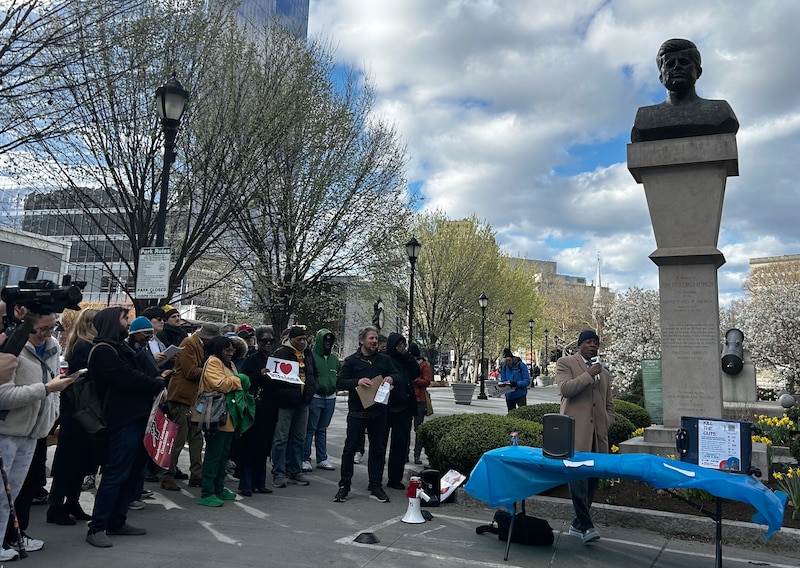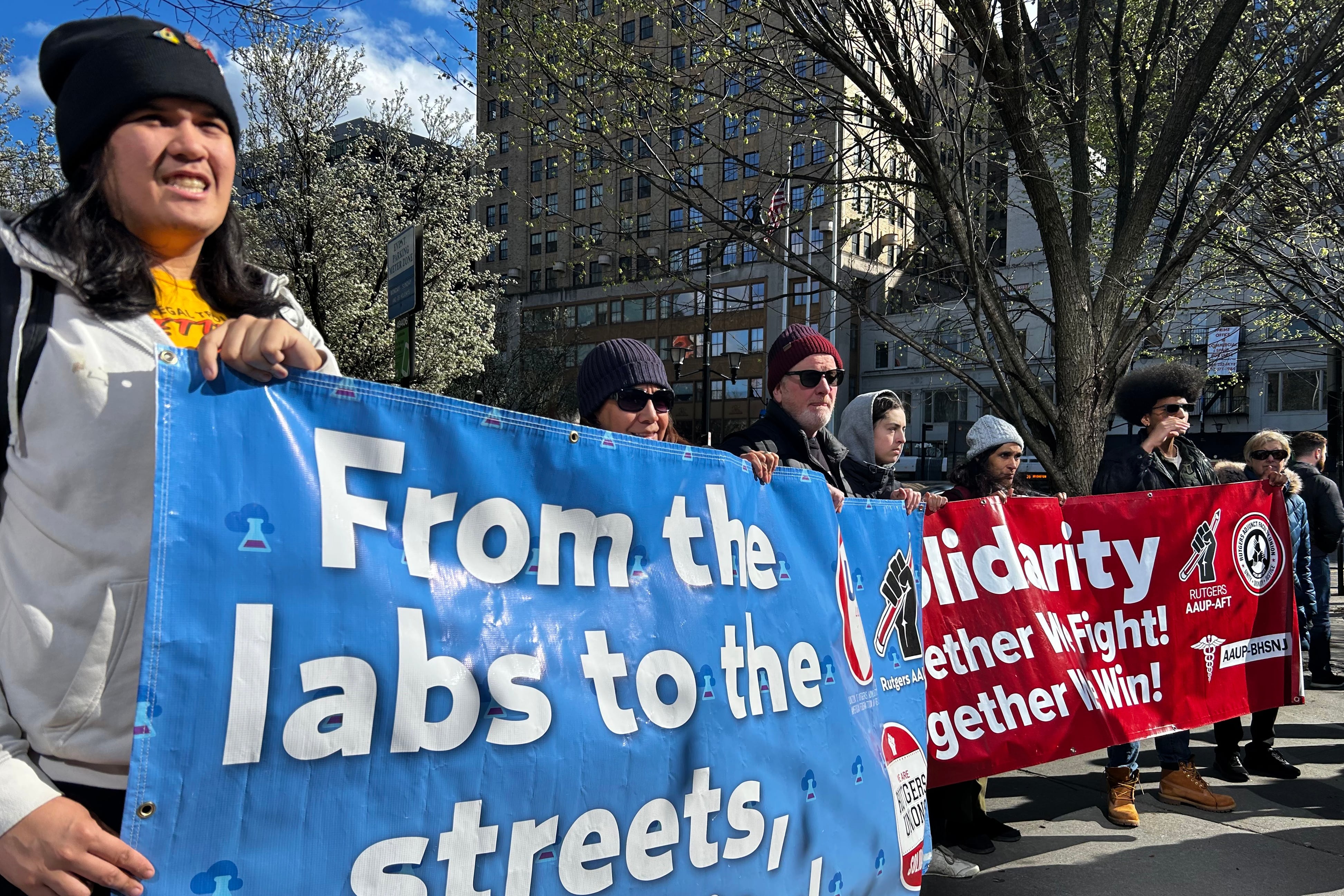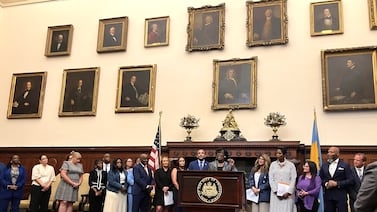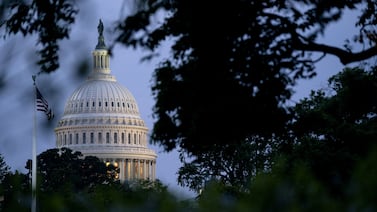Sign up for Chalkbeat Newark’s free newsletter to get the latest news about the city’s public school system delivered to your inbox.
Jennie Demizio, a special education teacher at Park Elementary School in Newark, stood in a crowd full of dozens of educators and union members and listened to speakers talk about the Trump administration’s threats to cut funding for education.
One by one, speakers listed the potential impacts of federal cuts on programs at New Jersey’s universities and colleges, health care, and research. Protesters yelled “shame” and “boo” after speakers detailed the effects of funding cuts on schools.
After the rally on Tuesday, Demizio held back tears and her voice cracked as she told Chalkbeat Newark how her students with disabilities rely on federal funding to get to school and for services such as speech therapy and classroom aides.
“Half of my students arrive in ambulances. They’re on oxygen, they have seizure disorders, and just their transportation alone to get to school costs thousands of dollars a year,” said Demizio as her voice cracked while holding back tears. “I’m just so worried we’re going to lose this funding.”
Demizio’s fears echo those of many educators in Newark and across the state who feel that students will lose essential resources because of the administration’s threats to education. The protesters hope school districts, higher education institutions, and local leaders will band together to fight looming cuts and protect students and staff.
The protest in Newark was part of the “Kill the Cuts” demonstration, a national day of action with protests in over 30 cities across the country. About 50 city educators and labor unions gathered in front of a bust of John F. Kennedy at Military Park on the windy Tuesday afternoon, where they held signs that read “hands off my students” and chanted “stand up, fight back.”
The protest in Newark centered on threats to health care, immigrants, research, and the Trump administration’s threat to withhold federal funding from school districts and universities that don’t eliminate diversity, equity, and inclusion programs deemed unlawful by the administration.
Last week, federal officials gave state education agencies 10 days to certify the elimination of DEI efforts in schools or risk losing federal funding. That directive threatens roughly $1.2 billion in federal funding for New Jersey schools, including $77 million for Newark Public Schools, the state’s largest district. That funding makes up around 5% of the district’s $1.5 billion budget for the upcoming school year.
“There’s no way that municipalities can totally foot that bill,” said Demizio.“I’m in a classroom where there are nurses, aides, and, you know, I think I feel like special education teachers, especially, are vulnerable at this moment.”
Last week’s attack on DEI programs in schools comes days after federal education officials also announced they would revoke deadline extensions to spend federal COVID aid that had been approved by the Biden administration.
As a result, 20 school districts across New Jersey could lose an additional $85 million in federal funding for infrastructure projects already in progress. That includes Newark Public Schools, which was approved for a $17 million extension to finish installing artificial intelligence cameras last fall. Paul Brubaker, the district’s director of communications, did not respond to questions about the status of the district’s AI cameras project or budget plans if federal funds are cut.
For Shelby Wardlaw, a professor and vice president of non-tenure track faculty at Rutgers University, the attacks feel personal. International students are worried about getting their visas revoked, and immigrant students fear they might be targeted due to their legal status, Wardlaw said.
In recent days, roughly a dozen Rutgers students “in good academic standing” learned their visas were revoked “without explanation,” according to an April 6 letter from Rutgers President Jonathan Holloway. Across the country, more than 300 international students and recent graduates have had their legal status changed by the federal government.
Additionally, some Rutgers faculty members are concerned about cuts to DEI initiatives and the impact that could have on teaching and learning.
Melissa Rodgers, a professor at Rutgers New Jersey Medical School, spoke to the crowd on Tuesday about the devastating effects funding cuts to the National Institutes of Health and anti-DEI initiatives will have on medical and scientific research. Rodgers, a biomedical professor, has been investigating the impacts of sex on kidney disease, research that’s now at risk under proposed cuts, Rodgers said.
Wardlaw and her colleagues want Rutgers and other universities in the Big Ten Academic Alliance Conference to band together to share legal resources and funds to combat federal funding threats to higher education. Last month, the Rutgers University Senate passed a resolution calling on those universities to form a “Mutual Defense Compact” to protect and defend “academic freedom, institutional integrity and the research enterprise,” according to The Daily Targum, Rutgers student-run newspaper.
“Universities are bastions of knowledge and resistance that would oppose an authoritarian overreach, and they’re going to come after us first,” Wardlaw told Chalkbeat on Tuesday. “They’re trying to break us as a potential site of resistance.”

Protesters at the Newark rally also heard from union leaders, civil rights activist Larry Hamm, and gubernatorial candidates Sean Spiller and Mayor Ras Baraka, who urged educators, laborers, and immigrant rights activists to band together to fight federal threats.
“We must resist,” all three speakers urged the crowd on Tuesday.
“The same people that were trying to stop [workers] from having fair working conditions and a rise in their wages were the same people who were opposed to ending Jim Crow Laws, opposed to civil rights, and opposed to democracy and justice,” Baraka told protesters.
Randi Weingarten, president of the American Federation of Teachers, also spoke on Tuesday and called the Trump administration’s move to cancel funding for Johns Hopkins University and $400 million in grants to Columbia University an assault on education. The AFT is a party to eight lawsuits against the Trump administration’s attacks on education, access to records, and public health, according to the group.
“We have young people engage in critical thinking and problem solving so they can discern fact from fiction, so they can stand up for themselves, so they know how to think,” Weingarten said. “That is what we do and what this administration is so fearful about.”
Jessie Gómez is a reporter for Chalkbeat Newark, covering public education in the city. Contact Jessie at jgomez@chalkbeat.org.







